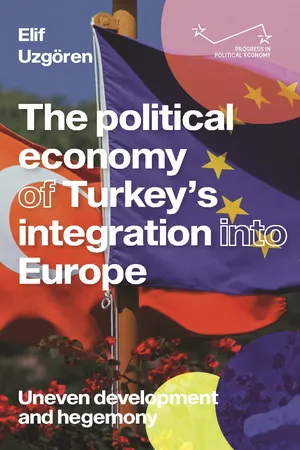
The political economy of Turkey's integration into Europe
Uneven development and hegemony
- English
- ePUB (mobile friendly)
- Available on iOS & Android
The political economy of Turkey's integration into Europe
Uneven development and hegemony
About this book
This book examines Turkey's integration with Europe within structural dynamics of globalisation from a critical political economy perspective. Critical approaches have been sidelined within European Studies. Turkish enlargement is not an exemption. The analyses are based on original data generated by 109 interviews conducted in 2010, 2017 and 2023 with five categories of actors: representatives of capital and labour, political parties, state officials, and struggles around ecology, patriarchy and migration. It argues that the pro-membership was hegemonic in the 2000s which was contested by two rival class strategies, Ha-vet and neo-mercantilism. In the 2010s, pro-membership is no longer hegemonic within rising critical tone of social forces supporting rival class strategies. Unevenness of Turkey's trajectory of integration to Europe is likely to be consolidated through market integration and management of migration through transactional approach.
Frequently asked questions
- Essential is ideal for learners and professionals who enjoy exploring a wide range of subjects. Access the Essential Library with 800,000+ trusted titles and best-sellers across business, personal growth, and the humanities. Includes unlimited reading time and Standard Read Aloud voice.
- Complete: Perfect for advanced learners and researchers needing full, unrestricted access. Unlock 1.4M+ books across hundreds of subjects, including academic and specialized titles. The Complete Plan also includes advanced features like Premium Read Aloud and Research Assistant.
Please note we cannot support devices running on iOS 13 and Android 7 or earlier. Learn more about using the app.
Information
Table of contents
- Cover
- Half-title page
- Series page
- Title page
- Copyright page
- Contents
- Tables
- Abbreviations
- Introduction
- 1: Historical materialism: encountering the post-Marxist critique
- 2: Integration of a peripheral country into the capitalist world system: Turkey's political economy
- 3: Globalisation and class struggle between Turkish capital and labour during the 2000s reform process
- 4: Globalisation and struggle in political and civil society
- 5: Deglobalisation? Reconsidering the struggle under authoritarian neoliberalism
- Conclusion
- Interviews
- Bibliography
- Index